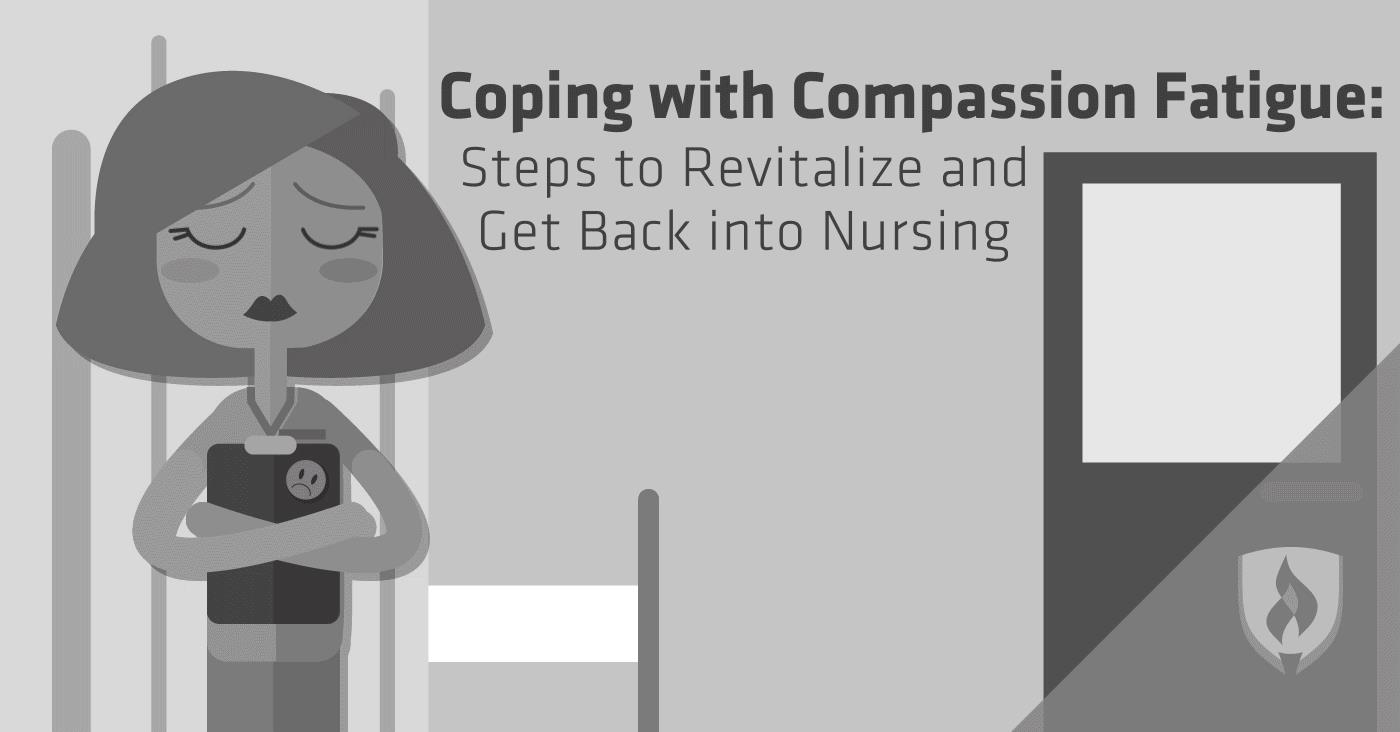Coping with Compassion Fatigue: Steps to Revitalize and Get Back into Nursing
By Emily Hayden on 08/08/2017

A patient’s first impression of a clinic or hospital is heavily based on the bedside manner of the nurses they encounter. Does my nurse see me as an individual instead of just another illness to be evaluated? Or are they just on a mission to clock out for the day? Will my nurse make an effort to understand the trauma this illness has caused in my family, or will they make assumptions to avoid the emotional investment?
The empathy and compassion required to be an effective nurse can also be exactly what leads these healthcare professionals to leave the field in search of a job that is not as emotionally taxing.
Being a caregiver can and should be rewarding. But what happens when all that giving begins to take its toll? This is when compassion fatigue becomes a concern. But before you decide nursing isn’t for you, read on to find out what the experts have to say about dealing with compassion fatigue.
Get Your Nursing School Questions Answered at a Nursing Information Session
What is compassion fatigue?
While many of us have heard the term “burnout” used when it comes to the reason for someone struggling with a job or leaving a career, it is important to differentiate between burnout and compassion fatigue. According to the American Institute of Stress:
- Burnout is characterized by exhaustion caused by a heavy workload and stress in the work environment. It does not involve trauma.
- Compassion fatigue is the strain of constantly working with people suffering the consequences of traumatic events.
“Compassion fatigue is when job burnout and secondary trauma blend together in a whirlwind of chaos that wears down the nurse’s ability to provide effective care … it looks like a highly empathetic nurse who has been robbed of their passion,” says Barbara Rubel, author of Self-Care Strategies for Compassion Fatigue Prevention.
As you can imagine, this is a real concern for nursing professionals, who are constantly caring for those in vulnerable states. It’s important to be able to detect compassion fatigue and know how to overcome it.
What are the symptoms of compassion fatigue?
If you are a nurse yourself or perhaps are considering this field of work, you might be familiar with the energy it takes to empathize with people experiencing pain. Maybe you are wondering if you are starting to show signs of compassion fatigue.
Take a look at the following symptoms to understand what compassion fatigue involves. It’s important to note that experiencing symptoms in limited amounts is not compassion fatigue, but the possibility is much more likely if you are experiencing these symptoms with great frequency.
These symptoms are identified by Rubel in her book, Death, Dying and Bereavement:
- Listening to the stories of grief and trauma has engulfed you.
- You feel the need to take away the pain of others.
- You empathize with those you help.
- You have little control over your work schedule.
- You are more irritated than people think.
- Your basic assumptions about life have been shattered.
- You are experiencing similar trauma symptoms as those you support.
- You feel more isolated than usual.
- You feel guilty you can’t do more to help.
- You have distressing nightmares based on the stories of those you help.
How do you cope with compassion fatigue?
While in the throes of these symptoms, it can be difficult to navigate a way back to your fulfilling nursing career. Here are a few suggestions from the experts when it comes to dealing with compassion fatigue.
What to do:
Rest and rejuvenate: Keith Carlson, nurse liaison for Nurse.org, insists on the importance of intentionally planning on doing enjoyable activities outside of work to encourage the mindset that life can exist apart from your job.
“Getting enough sleep is important, not to mention proper nutrition and hydration,” Carlson says. He also recommends nurses take up an exercise routine to help relieve stress.
Make changes at work: “When compassion fatigue is severe, an understanding manager may allow the nurse to temporarily take on duties not related to patient care,” Carlson says.
Carlson explains that it might only take a few weeks or months away from direct care for high-needs patient populations for a nurse to recover from compassion fatigue. Don’t be afraid to be honest about your symptoms. It is in everyone’s best interests for you to take the needed time to recover and come back stronger than ever before.
Seek professional support: If you are experiencing very serious compassion fatigue, Carlson recommends seeking professional help. He suggests Employee Assistance Programs (EAPs) that usually offer complete privacy in terms of personal information and the course of treatment.
What not to do:
Turn to substances: Even though you work in the field of healthcare and witness the destructive effects of substance abuse in your patients, it does not make you immune to the temptation of self-medicating. Carlson explains that alcohol, tobacco and drugs (whether prescription or illicit) are places that nurses can choose to turn when the going gets tough. Instead of helping, turning to substances will actually increase your struggle with compassion fatigue and put your career in danger.
Deny the facts: “If compassion fatigue has taken hold in a nurse’s life and career, soldiering on as if nothing is wrong is not a good strategy,” Carlson says.
Denying or ignoring your symptoms can lead to grave errors on the job, poor performance reviews, substance abuse and stress-related illness. Compassion fatigue cannot be cured by pretending it does not exist.
Speak in always/never statements: Rubel warns against overgeneralizations that can cause you to make the situation worse than it is. Phrases like “I always fail,” or “I never get it right,” will skew your perception of the truth. These extremes create a mindset that does not allow for making mistakes and will increase the negative effects of compassion fatigue.
The other side of the coin
Compassion fatigue is a tough fact of life for many nurses, but that doesn’t mean nursing is always a psychological drain. Carlson says he is optimistic about the career and the fulfillment that comes from the tangible differences a nurse can make with their patients.
“There is an endless list of things that make nursing rewarding,” Carlson says.
While it is important to focus on all the positive aspects of nursing, it is also crucial to address the challenge of compassion fatigue that some nurses will encounter as they strive to give the best care to their patients. It’s also encouraging to know you can overcome it and continue the career you love.
Discover more about the rewarding aspects of nursing by reading our article, “The Best Day on the Job: 4 Nursing Stories That Prove It’s All Worth It.”
RELATED ARTICLES:




